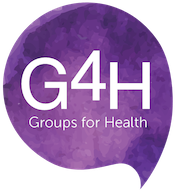For
Participants
“There are times in our lives when it is hard to do what we need to do to keep socially connected.
This is where Groups 4 Health comes in.”
What is Groups 4 Health?
Is Groups 4 Health a program for me?
If you are feeling:
- sad,
- stressed and nervous,
- or lonely or isolated
…then Groups 4 Health can help. The program addresses these issues by helping you to strengthen your existing social connections and develop new ones.
What topics will be covered?
Session 1 – Why your social group ties matter?
- Increases awareness of the role that social groups play in our lives
- Helps people to discover the benefits of social groups
Session 2 – Mapping your social world
- We will illustrate your social group networks and relationships between them
- This will be used to identify any areas that can be strengthened and developed further
Session 3 – How to make the most of your existing social networks
- Discovering the best ways to make the most of your group ties
- Identifying key ways to reconnect with old group ties
Session 4 – Building new connections
- Identifying groups one wants to join
- Developing the confidence to join new groups
Session 5 – Ensuring your group ties endure
- Troubleshooting any issues encountered in managing social groups
How much does the program cost?
Nothing! The program is free.
What is involved?
After registering your interest by filling out the form below, a member of our research team will send you an email, requesting you to fill in an online questionnaire before the group commences. The information you provide helps us to check on your eligibility for the program. Once complete, we will tell you if you meet the eligibility criteria. In order to check how you are going and if the program is helpful, you will also be asked to fill in some surveys and other measures throughout the program and 2 months after it finishes.
When and where are the groups run?
The workshops will be conducted at The University of Queensland, St Lucia. Opportunities to participate will continue throughout 2017. The first 4 sessions of the workshop will take place at the same time each week, followed by the final session one month later (at the same time).
